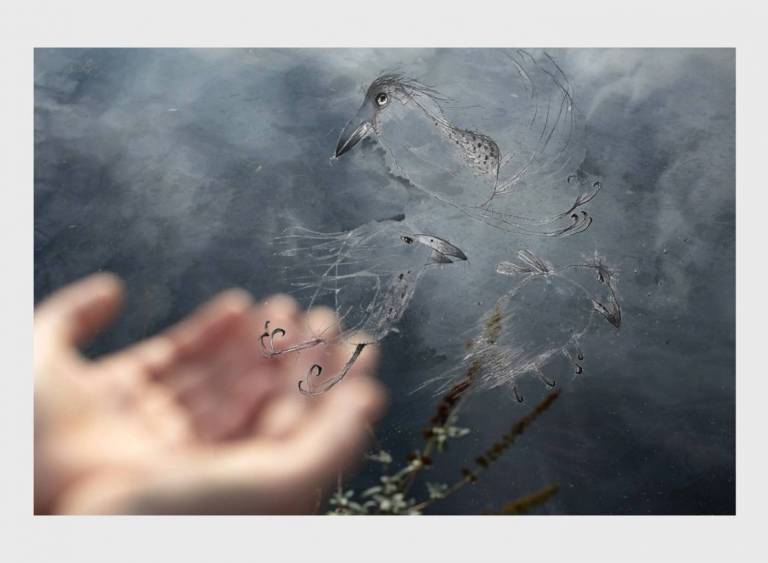UCL Public Art project explores the relationships and wellbeing of autistic east Londoners
18 June 2021
For Autistic Pride Day, Georgia Pavlopoulou, UCL Lecturer and autism researcher, and co-artists Jon Adams and Briony Campbell, discuss the Flow Unlocked project, part of the Trellis public art programme.

What are your backgrounds and how did you get involved in the Flow Unlocked project?
Our team is a collaborative; Georgia Pavlopoulou is an autism researcher and founder of the Group for Research in Relationships and Neurodiversity. She examines the role of social determinants in the mental health of autistic people and their families in their preferred ways. Jon Adams is a neurodivergent artist, polymath, synaesthete and mental health champion. Briony Campbell is an artist, facilitator and project manager.
We kickstarted this collaboration hoping that it will increase our understanding of autistic east Londoners’ sense of relationships, belonging and culture. Flow Unlocked is rooted in Georgia’s research looking at relationships as the foundation of mental health for autistic and non-autistic people.
What is the Flow Unlocked project and what has it aimed to achieve?
Flow Unlocked is a creative autistic-led collaborative project which highlights the importance of relationships to autistic people. The Flow Unlocked collective has been reflecting on personal and sensory relationships that have sustained them during the pandemic, as well as those they have missed. These reflections will be revealed through poetry, photography, drawing and film.
Our objectives, as co-established with our autistic consultants group, include supporting autistic east Londoners to co-create artistic reflections of their relationships under lockdown.
Traditionally, projects are made about autistic people not with them; Flow Unlocked breaks the mould by redefining autistic narratives from the perspective of lived experience.
How does the Flow Unlocked project relate to wider questions of relationships between autistic people and their environment, and representing narratives through art?
Autistic people face unique challenges and opportunities to socially connect to others. Those who do enjoy these connections are happier, healthier, and live longer. Focused on communities in east London, Flow Unlocked is a collaborative knowledge exchange project, which highlights the importance of relationships to autistic people’s mental health and quality of life.
Autistic relationships are rich, nuanced and creative and have proved to be a wonderful theme for a dynamic creative collaboration aiming to raise awareness of the social determinants of autistic mental health. The intense sensitivity with which autistic people relate to the world is rarely recognised, let alone celebrated.
This is why our Flow Unlocked group has been reflecting on the breadth of personal and sensory relationships that have sustained them before and during the pandemic, as well as those they have missed.
Like all humans, autistic people need companionship, but society’s inability to accommodate their needs causes autistic people to retreat into safer spaces, private places, and familiar sensory environments that they can predict and control.
How key are questions of co-authorship and representation in this work?
Redefining the autistic narrative from the perspective of lived experience is vital to building an inclusive community. When projects involve autistic people in genuine participation, we create safe spaces where creativity, friendship and authenticity can flow.
The co-produced artwork highlights the importance of an experience-sensitive approach honouring the uniqueness of each autistic co-creator and the ways they are affected by the sense of empathy for others and for the world – a world that sometimes does not feel safe.
What has been the most successful or rewarding aspect of the project?
Our co-created work has demonstrated the potential for creative participatory approaches to inform co-production of knowledge in mental health during the pandemic, reflecting the diversity of identity and experience of autistic people. We have achieved a creative space where community autistic consultants felt safe and empowered.
Very often autistic people are included but not involved, or have projects done to them, not with them. Reclaiming the autistic narrative from the perspective of lived experience is vital to building our culture and understanding.
When projects include autistic people determining the rules, boundaries of participation, methods, measures and outcomes we create safe spaces where creativity, friendship and authenticity can flow. True participation is not a token gesture but a gift.
You can experience an example of the work produced as part of the project in the video below.
 Close
Close

